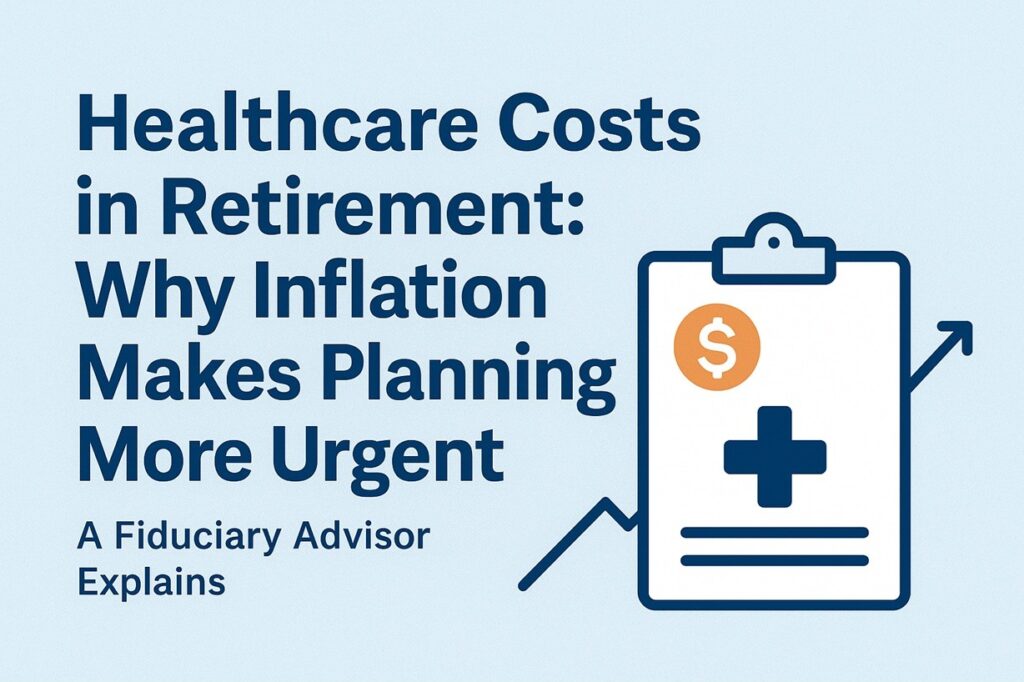
The Rising Tide of Healthcare Costs in Retirement
Inflation has impacted nearly every area of life — groceries, housing, utilities — but perhaps nowhere is it more concerning than in retirement healthcare costs.
For retirees, medical expenses aren’t optional, and inflation compounds the challenge. According to Fidelity’s 2025 Retiree Health Care Cost Estimate, a 65-year-old couple may need more than $350,000 to cover medical expenses throughout retirement — and that number continues to grow each year.
As a fiduciary financial advisor, it’s my responsibility to help clients understand how inflation affects their healthcare spending and what steps they can take to prepare.
How Inflation Impacts Retirement Healthcare Costs
Healthcare costs typically rise faster than the general inflation rate. Even during moderate inflationary periods, medical care inflation averages around 5–7% annually.
Key areas most affected include:
- Prescription drugs: Prices rise faster than average inflation due to supply chain and patent pressures.
- Medicare premiums: Part B and Part D costs often increase yearly.
- Long-term care: Assisted living and home care costs are projected to rise significantly through the next decade.
- Supplemental insurance: Policies designed to cover Medicare gaps are adjusting premiums upward to offset inflation.
The result? Retirees need to draw more from their savings just to maintain the same level of healthcare coverage — eroding long-term retirement income sustainability.
Why Proactive Planning Matters
Retirees often underestimate how much of their income will go toward medical expenses. Inflation only widens that gap. That’s why building an inflation-adjusted healthcare strategy is a critical part of comprehensive retirement planning.
Here are a few key steps:
- Incorporate healthcare inflation into your retirement projections.
Use conservative assumptions — aim for 5–6% annual healthcare inflation when modeling expenses. - Plan for long-term care early.
Consider hybrid long-term care insurance or annuity-based policies that grow with inflation and preserve flexibility. - Leverage Health Savings Accounts (HSAs).
HSAs offer triple-tax advantages and can serve as a valuable reserve for future medical expenses. - Review Medicare coverage annually.
A fiduciary advisor can help ensure your plan still fits your evolving medical and financial needs. - Integrate healthcare into your income strategy.
Combine inflation-protected income sources such as TIPS (Treasury Inflation-Protected Securities), annuities with cost-of-living adjustments, and diversified investments to preserve purchasing power.
The Fiduciary Approach to Inflation and Healthcare
As a fiduciary, I believe clients deserve advice rooted in transparency, long-term perspective, and data-driven strategy — not product sales. Addressing healthcare costs under inflationary pressure isn’t just about cutting expenses; it’s about designing a sustainable income plan that adapts over time.
Working with a fiduciary financial advisor ensures your healthcare planning aligns with your retirement income goals, risk tolerance, and legacy objectives — all while maintaining fiduciary duty to act solely in your best interest.
Final Thoughts
Inflation isn’t temporary — it’s a structural reality that every retiree must plan around. Healthcare costs will continue to rise, but with the right strategy and fiduciary guidance, you can stay ahead of it.
Call to Action
If you’re nearing or in retirement and want to understand how inflation could impact your healthcare and income plan, now is the time to act.
📞 Schedule a consultation to build an inflation-aware healthcare and retirement strategy tailored to your unique needs and long-term goals.
Global View Capital Management (GVCM) is an affiliate of Global View Capital Advisors (GVCA). GVCM is a SEC Registered Investment Advisory firm headquartered at N14W23833 Stone Ridge Drive, Suite 350, Waukesha, WI 53188-1126. 262.650.1030. Ryan Peca is an Investment Adviser Representative (“Adviser”) with GVCM. Additional information can be found at www.adviserinfo.sec.gov Global View Capital Insurance Services (GVCI) is an affiliate of Global View Capital Advisors (GVCA). GVCI services offered through Experior Financial Group, ASH Brokerage, and/or PKS Financial. GVCI is headquartered at N14W23833 Stone Ridge Drive, Suite 350, Waukesha, WI 53188-1126. 262-650-1030. Ryan Peca is an Insurance Agent of GVCI.
These views do not necessarily represent the views of GVCM or any of its affiliates. Investment involves risk.
The company profile is for informational purposes only and its contents should not be construed as a recommendation. The information on this social media site alone cannot and should not be used in making investment decisions. Investors should carefully consider the investment objectives, risks, charges and expenses associated with any investment.